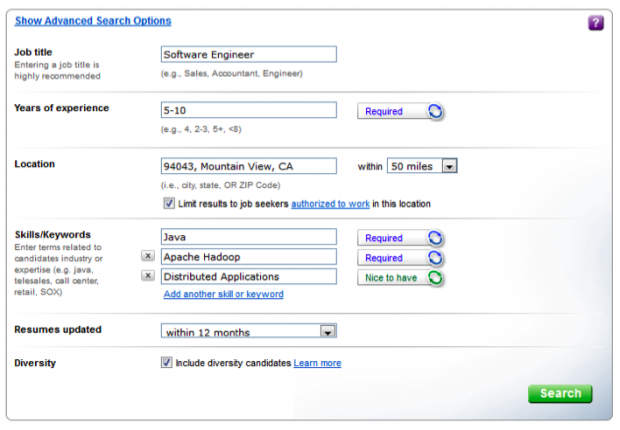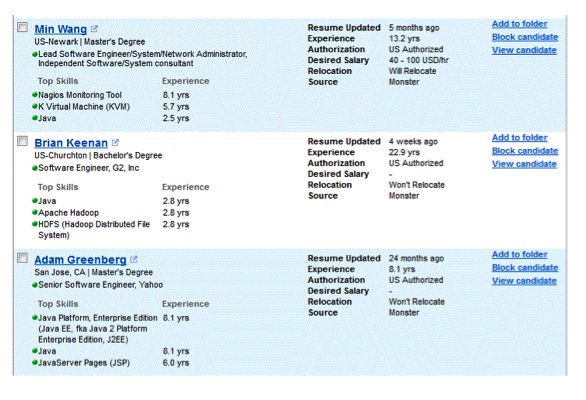Lately, Monster has been touting their “Power Resume Search” as a simple and powerful way to source candidates without the need to create complex Boolean strings. All a sourcer or recruiter has to do is populate a few search fields with keywords and, in theory, Monster will provide you with accurate, intelligent results. I decided to make the switch to Monster’s Power Resume Search for a few searches to see if it could out-perform traditional Boolean queries. Obviously, entering keywords is much faster than doing research and formulating a string, but the money is in the results. Will Monster’s Power Search negate the need for Boolean wizardry?
For the uninitiated, Monster’s Power Resume Search works a little like this: a user enters a job title and keywords or specific skills they would like to search. Monster’s search engine then attempts to match said skills with other keywords in their database that are relevant to the ones the user has entered. For example, entering a job title of “software engineer” will automatically search for words like “developer”, “application”, and “software”. The user can then refine their search by desired years of experience, making a skillset required or nice to have, and showing only candidates who are willing to relocate or authorized to work in a specific location.

The first search I conducted was for a Java developer specializing in Hadoop and distributed systems. With Power Resume Search this is as simple as using “Software Engineer” for a job title, then adding Java and Hadoop as required skills with “distributed applications” as a nice to have skill. Now, being human and having run these searches before, I know there are some technologies I can include in a Boolean string to find candidates with Hadoop experience who may not explicitly say Hadoop. I was extremely curious to see how Monster accounted for this. Had I been running what Monster calls a “Classic Resume Search” I may have had a string like this:
(“software developer” OR “software engineer” OR developer OR programmer OR sde OR “hadoop engineer”) AND java AND (hadoop OR hbase OR hdfs OR yarn OR mapreduce OR “map reduce” OR ambari OR cassandra OR chukwa OR hive OR mahout OR pig OR zookeeper)

After going through the first handful of results (sorted by relevance) I noticed some anomalies. First, Monster was equating and returning the word ‘Apache’ in place of Hadoop. Why? My guess is because Apache owns Hadoop, therefore Monster thinks the terms are interchangeable. However, Apache is web-server software and Hadoop is an unstructured data processing system; two completely different beasts. To make sure Monster wasn’t returning “Apache” as part of my distributed applications skill I went back and ran the search without it. Sure enough, Apache was still being returned as a relevant keyword for Hadoop. Not good.
I also wanted to know if Monster would automatically search for technologies associated with a given skill, and I was pleased to find out it does, but with some limitations. Monster seems to search associated technologies only if your main skill is listed somewhere on a candidate’s profile. This means I will see profiles with Hadoop-associated technologies like HDFS or Map/Reduce only if the candidate has the word Hadoop somewhere on their profile. While these candidates were correct, this unfortunately meant I was not seeing candidates who may have experience with Hadoop-associated technologies but did not explicitly write “Hadoop” on their resume. Furthermore, for some reason technologies like HDFS, Hbase, Hive, Pig, or Zookeeper were not highlighted as relevant to the search. In fact, Monster was more interested in pointing out a candidate had experience with Apache web server (which, again, is not what I’m looking for) than the technologies directly associated with my required skill.
Also, at times it seems Monster’s search engine confuses itself with the terms it chooses to search as associated keywords. For example, I was getting results that did not have the “Software Engineer” job title I required, but had the associated terms “software” and “application”. For example, QA Engineers who worked closely with “Software Engineers” testing “software” or “applications” with the word “Hadoop” on their resume.
Caption: Why?
For another search I used the “Software Engineer” title with a required skill of NLP (Natural Language Processing) and a required skill of Java. Had I been doing a Boolean search my string would have looked something like:
(“software developer” OR “software engineer” OR developer OR programmer OR sde) AND java AND (nlp OR “natural language” OR nlu OR hci OR “human computer” OR ml OR “machine learning” OR “machine translation” OR ner OR “named entity”)
The results this time were more promising but still not amazing. It seems as if Monster uses the words “Language” and “Process*” in association with NLP as I was seeing candidates with payment processing, order processing, and experience with Intel processors. However, phrases I had never thought of using in a string, such as “natural language parsing”, “text processing”, and “lexical analysis” were appearing. This was incredibly rewarding as those candidates would have never have appeared in my Boolean search. Once more, some of the results were just plain wrong. QA Engineers, iOS developers, and other non-Java, non-Software Engineer candidates were being returned.
So, given that Monster’s Power Resume Search has some quirks, should you use it? Yes, but it shouldn’t replace your Boolean strings. If used in conjunction with Monster’s classic search, Power Resume Search does provide some utility. To their credit, Monster’s Power Resume Search returned some candidates I would not have come across with a Boolean search and returned search terms I would not have come up with on my own. So, while it may make some interesting choices in associated keywords and could use some finesse in how job title relevance is assigned, you will most likely find new candidates, which is exactly the point of using a job board.
Monster image is from Flickr.
